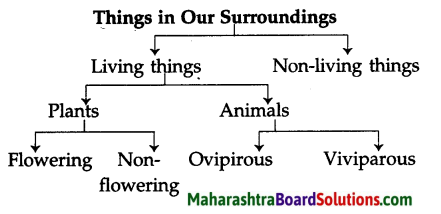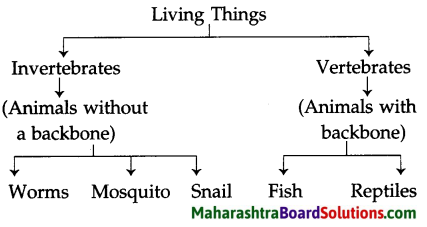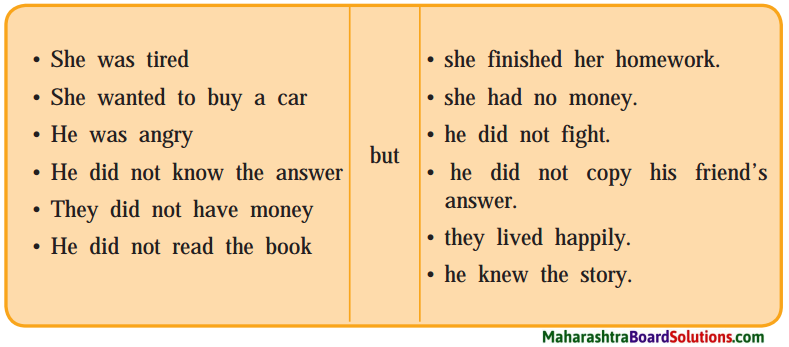Balbharti Maharashtra State Board Class 5 English Solutions Chapter 28 All about Money Notes, Textbook Exercise Important Questions and Answers.
Maharashtra State Board Class 5 English Solutions Chapter 28 All about Money
English Balbharati Std 5 Digest Chapter 28 All about Money Textbook Questions and Answers
1. Write a short note on ‘money’.
Question 1.
Write a short note on ‘money’.
Answer:
Money, a medium of exchange in the form of coins and notes are needed to buy goods and services. Coins and notes are different in different countries. In the United States dollars are used, while in England it is pounds. Long before paper money came into being, the barter system was followed, i.e. exchange of one thing for another. With the passage of time stones, bricks of salt, shells, and cowries were used as money. Grains, farm produce, cattle, goats, and chickens were exchanged for tools and implements or wages. Later precious metals and eventually paper money started being used. It is our duty to handle and spend money carefully, as earning it requires a lot of effort.
![]()
2. Look at the diagram on page 68. It is called a tree diagram because it has branches’. Now read the following and draw a tree diagram to show this information.
Question 1.
Look at the diagram on page 68. It is called a tree diagram because it has branches’. Now read the following and draw a tree diagram to show this information.
Things in our surroundings form two groups – living things and non-living things. Living things are of two kinds, plants and animals. There are two types of plants – flowering plants and non-flowering plants. If we consider animals, we see that some animals lay eggs. They are oviparous animals. Some animals give birth to their young ones. They are viviparous animals.
Answer:

Find more topics from your Environmental Studies or Mathematics textbooks for drawing tree diagrams. Draw and label the diagrams.
Life on earth began with unicellular I organisms known as protozoa. The following are the stages of evolution of animals. Invertebrates are animals without a backbone, for e.g., a snail. The vertebrates are animals which have a backbone. E.g. Aquatic animals like fish. Animals which: live in water and also on land are called amphibians. E.g. A frog. A few invertebrates are worms and mosquitoes and a few I vertebrates are reptiles.
Answer:

![]()
3. Make meaningful sentences from the following table.
Question 1.
Make meaningful sentences from the following table.

Now try joining the sentences in the two columns using 1. and, 2. because.
Answer:
- She was tired but she finished her homework.
- She wanted to buy a car but she had no money.
- He was angry but he did not fight.
- He did not know the answer but he did not copy his friend’s answer.
- They did not have money but they lived happily.
- He did not read the book but knew the story.
Now try joining the sentences in the two columns using and.
- She was tired and she finished her homework.
- She wanted to buy a car and she had no money.
- He was angry and he did not fight.
- He did not know the answer and he did not copy his friend’s answer.
- They did not have money and they lived happily.
- He did not read the book and knew the story.
Note: When we use the conjunction ‘and’ instead of ‘but’ the meaning either changes completely or makes the sentence meaningless.
Now try joining the sentences in the two columns using because.
- She was tired because she finished her homework.
- She wanted to buy a car because she had no money.
- He was angry because he did not fight.
- He did not know the answer because he did not copy his friend’s answer.
- They did not have money because they lived happily.
- He did not read the book because knew the story.
Note: When we use the conjunction ‘because’ instead of ‘but’ the meaning either changes completely or makes the sentence meaningless.
![]()
4. Ask your parents or other grown-ups to show you some used notes. Observe them carefully. Have they been used properly? Write your observations.
Question 1.
Ask your parents or other grown-ups to show you some used notes. Observe them carefully. Have they been used properly? Write your observations.
Answer:
Observations:
- Some notes are torn while others are dirty.
- People have scribbled their names and phone numbers on the notes.
- There are notes which are stapled or sealed with cello tapes making it invalid.
- The notes are crumpled.
![]()
5. Write an autobiography of a hundred-rupee note. (8-10 lines.)
Question 1.
Write an autobiography of a hundred-rupee note. (8-10 lines.)
Answer:
Hello friends! I am a thousand rupee note, an Indian currency. I was born in the year 2000. Pretty and pink, I have a great value. The great leader of India’s freedom struggle, Mahatma Gandhi’s portrait on me is a matter of great pride for me.
Born at Currency Note Press in Nashik, Maharashtra, my journey has been a long one. From one person to another, poor and rich, young and old, I have been with them all, even though for a short while.
While some took care of me and worshipped me, others mishandled me. But that’s life! There will be good and bad experiences.
But my request to you, friends is: handle and spend me carefully. After all such a lot of efforts go into earning me. Hope you have made a ‘note’ of it.
![]()
English Balbharati Std 5 Answers Chapter 28 All about Money Additional Important Questions and Answers
Answer the following in one sentence:
Question 1.
Why do we need money?
Answer:
We need money to buy things and to pay people who work for us.
Question 2.
In which forms do we see money today?
Answer:
We see money today in the form of coins and notes.
![]()
Question 3.
What are the names of money used in The United States and in England?
Answer:
In The United States they use ‘dollars’ ($) while in England they use ‘pounds’ (£).
Question 4.
What was known as barter’?
Answer:
Long, long ago, people did not use coins and notes but exchanged one thing for another and this was known as ‘barter’.
Question 5.
Name any two things used as money in the past.
Answer:
Shells and cowries.
![]()
Question 6.
When was paper money first used?
Answer:
Paper money was first used in China aboutn one thousand years ago.
Activities :
Question 1.
Complete the table of Dos and Don’ts which we should remember while handling money.
Answer:
| Do’s | Don’ts |
| 1. Use money carefully. | 1. Spend thoughtlessly. |
| 2. Should spend within your means and not be lavish. | 2. Write, tear or crumple the notes or damage them in any way. |
| 3. Spend mostly for your necessities and comforts. | 3. Spend on luxuries if you do not have the means. |
| 4. Cut your coat according to your cloth. | 4. Neither a borrower nor a lender be. |
![]()
Do as directed:
Question 1.
Given below are a list of conjunctions. Use them in sentences of your own. If, and, unless, because, or
Answer:
- I will forgive you if you promise to mend your ways.
- Ram and Shyam are hardworking and industrious.
- India will not progress unless we control population growth.
- I will be late because I missed the bus.
- She must work hard or she won’t excel.
Writing Skills
Read the following passage and draw a tree diagram to show this information
Question 1.
Write an essay on:
Answer:
An autobiography of a thousand-rupee note. Hello friends! I am a thousand rupee note, an Indian currency. I was born in the year 2000. Pretty and pink, I have a great value. The great leader of India’s freedom struggle, Mahatma Gandhi’s portrait on me is a matter of great pride for me. Born at Currency Note Press in Nashik, Maharashtra, my journey has been a long one. From one person to another, poor and rich, young and old, I have been with them all, even though for a short while. While some took care of me and worshipped me, others mishandled me. But that’s life! There will be good and bad experiences. But my request to you, friends is: handle and spend me carefully. After all such a lot of efforts go into earning me. Hope you have made a ‘note’ of it.
![]()
All about Money Summary in English
Summary :
Money is a medium of exchange in the form of coins and notes. Currency is a system of money in general, used in a particular country. Even as the lesson takes us through different cash money, i.e., coins and notes we use in India, it also tells us that money is known by different names in different countries. The money used in the United States are ‘dollars’ (S) while in England ‘pounds’ (€) are used.
The lesson takes us back in time when the barter’ system was used. It was only about 1000 years ago that paper money first came to be used, first in China, Paper money or notes with no value of their own is a promise to give that much money. Only the government is allowed to print the notes. The lesson ends with two words of advice. handling money properly and using it carefully. After all it takes efforts to earn money.
Meanings :
- barter (n) – exchange for other goods or services.
- cowries (n) – a flattened yellowish shell of a marine animal used as money in parts of Africa and Indo-Pacific area.
- implements (n) – tools and other equipments used for a particular purpose.
- crumple (v) – crush something leading to creases and wrinkles.